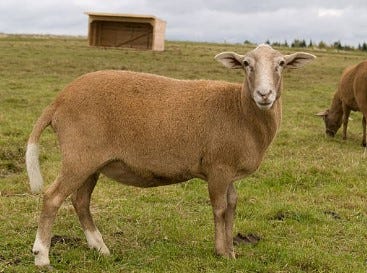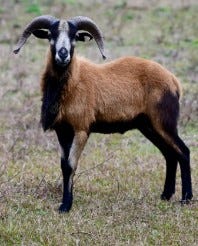Dear Dr. McNett is a weekly column of questions asked by readers. It is published each Tuesday. To submit your small stock questions please post them in the website chat, respond to the email newsletter or send a direct message.
What is the purpose of the hair sheep?
Hair sheep are generally kept for meat and for helping land stay cleared and fertilized. Hair sheep are great options for people who do not want wool as these sheep shed annually and do not need to be sheared. Also, many hair sheep breeds are from tropical climates and are therefore accustomed to living with larger parasite burdens than their wooly counterparts from more temperate areas.
Katahdin (above) and Barbados Black Belly (below) are two examples of popular hair sheep breeds.
What is your favorite superstition about sheep?
Probably no surprise, I love sheeplore. My most recent favorite is from Ireland. It involves an ancient practice of running sheep into a home where any person has recently died, especially from fever. According to tradition, keeping the sheep in the house for three days makes the space safe again for human occupants.
Another piece of folklore I really like, I first heard in Terry Pratchett's Tiffany Aching Series. As it turns out, it is based on the real tradition of burying a shepherd with a tuft of wool so that Heaven would understand that sheep were the reason they were so often missing from church.
Here is a link to a lovely podcast which mentions both of these traditions among many others.
Are there common genetic diseases for sheep? If so, what are they and how are they screened for?
Certain lines of sheep can be prone to genetic disorders. Most of these disorders can be spotted at birth or shortly thereafter. Some disorders are fairly manageable with the help of a veterinarian, like entropion (inverted eyelids). Others require more serious intervention like cryptorchidism (retainment of one or both testicles in the abdomen). Unfortunately, there are some disorders which are incompatible with life, such as cleft palate (a break in the hard palate of the mouth causing milk to regularly enter the lungs rather than stomach) and spider lamb syndrome (a lamb disease causing severe skeletal abnormalities at birth or in the first 6 weeks of life).
Currently, a test exists to identify carriers of Spider lamb syndrome (Ovine hereditary chondrodysplasia). We have no tests for the other genetic disorders mentioned above that I am aware of. Spider Lamb syndrome occurs almost exclusively in Suffolk or Hampshire breeds. It does not occur in any white faced breeds. The disease will only occur if both parents are carriers of the recessive gene that causes it. Therefore, these pairings can be avoided if carriers are identified with genetic testing. Individuals can be tested with a wool sample (pulled out at the roots) sent to the veterinary laboratory at UC Davis. If lambs are born with skeletal deformities and there is a concern for spider lamb syndrome post mortem testing can also be pursued.
Additionally, there are several other breed specific genetic defects (dwarfism, callipyge muscling, parrot mouth, hairy lamb etc.). Breed associations are a great source of information for which specific genetic disorders to be aware of and where affordable testing can be found.
What do you know about the origin of the word sheep?
According to one of my favorite etymology sources, the Oxford English Dictionary, the word sheep seems to be distinctly Western European. It cannot be traced past an old Germanic form. These words always refer to the same animals of the Ovis genus. One thing I found interesting was that almost every form of this word is the same whether singular or plural with the exception of one Old Northumbrian form scipo.
If anyone has any more information about the word sheep, please send it along and I will publish the update.
A friendly reminder: I am a veterinarian. I am not your veterinarian. Dear Dr. McNett is not meant for diagnosing or prescribing and is not a replacement for a relationship with a veterinarian who knows you and your animals.
If you are finding this free column helpful, but not interested in subscribing, please consider buying my sheep and I a cup of tea.





